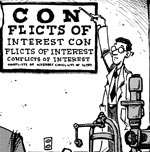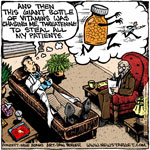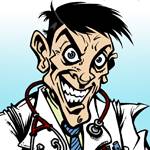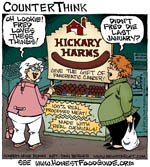How Increasing Serotonin Production and Limiting Its Reuptake May Relieve Symptoms of Obsessive-Compulsive Disorder (OCD)
| Share on Facebook | Share on Twitter | Share on Google+ |
Rick had an obsession with picking his nose.
He simply could not resist pulling at crusts of mucus the moment they appeared, no matter where he was, no matter who might be watching, no matter what he needed to be doing.
Rick's nostrils were rubbed raw from constant finger contact, and the septum separating his nostrils was constantly infected. When the damage from fingering his nose nearly every waking moment started to threaten his sight and hearing, Rick was finally forced to submit to psychiatric treatment.
The many faces of OCD. Rick's obsession with his nose is unusual, but millions of people suffer their own symptoms of obsessive-compulsive disorder, also known as OCD. One person may compulsively avoid stepping on cracks in a sidewalk. A prominent actor and game show host is afraid of catching germs by shaking hands, and shaves his head to keep germs out of his hair. Another person may need to go back home eight, ten, or twenty times every morning to make sure the gas stove is shut off.
The most common obsession is possible "contamination," but people with OCD may become preoccupied with prayer, saving, hoarding, sex, or the need for symmetry and order. OCD occurs more frequently in males than in females, more frequently in people of European ancestry than in other ethnic groups.
Scientists believe that OCD is often triggered by an autoimmune infection to strep throat or ear infections. White blood cells begin to attack certain serotonin producing sites as if they were bacteria, and a shortage of serotonin in the brain causes anxiety, depression, and the symptoms of OCD.
A new therapy for treating OCD. In 2009, the US Food and Drug Administration approved a new method of treating OCD called deep brain stimulation, abbreviated DBS. In this method, a surgeon implants electrodes on one or both sides of the brain of a person who has OCD. The electrodes deliver a pulsating current to the brain, interrupting the thoughts that lead to obsessive or compulsive behavior. DBS is the first surgical technique approved for the treatment of a psychiatric disorder since the introduction of frontal lobotomy in 1935.
But many doctors fear that DBS is just another form of lobotomy, much less likely to kill the patient outright through imprecise cuts or infection.
Back to basics for treating OCD. Most of the doctors who offer DBS for OCD don't usually treat OCD patients. The technique is much more commonly used to treat Parkinson's disease and Tourette's syndrome. Critics of DBS say there simply is no research confirming that it really improves quality of life.
Fortunately, there are treatments that do improve quality of life for people who have OCD. Selective serotonin-reuptake inhibitors in the same class of drugs as Prozac, Paxil, and Zoloft bring relief to many OCD sufferers. Cognitive behavioral therapy with a psychiatrist or psychologist, along with medication, helps someone with OCD learn how to avoid irrational, repetitive behaviors by practice-and rational thinking. With a combination of treatment, many are able to lead a normal life, but how can improvements be maintained?
Help for staying free of OCD. Many people reach a point that they don't quite need medication for obsessive-compulsive disorder, but they don't quite feel OK, either. For these, natural interventions for maintaining serotonin levels may be part of staying well.
Key nutritional supplements for people with OCD who are not currently taking antidepressant medication are tryptophan , 5-HTP, vitamin B6, niacin, and SAM-e. Except for vitamin B6, none of these supplements should be taken by anyone who is on a prescription medication. The combination can be too much of a good thing, inducing serotonin syndrome, which causes problems of its own.
The exact recommended doses for adults with OCD are:
- 100 mg of 5-HTP
- 20 mg of vitamin B6
- 50 mg of vitamin B3 (niacin)
- 200 micrograms of folic acid
- 200 milligrams of vitamin C
- 100 IU of natural vitamin E
Children aged six and older might be given half the adult dosages. It is not necessary from a nutritional standpoint to follow this exact regimen each and every day, but taking these supplements at least five times a week for about six weeks is likely to improve symptoms, and taking them indefinitely will contribute to staying well.
Role of serotonin in obsessive-compulsive disorder
-
Skin CareMen Skin Care
-
Free ResourcesFree eBooks
-
Every human being is the author of his own health or disease.Buddha
-
Featured Health Supplement"...I also suffer from mild-to-moderate depression, so several months ago as an experiment I ordered a few bottles of the Neuro-Natural Serenity formula, but never took it consistently. However, I started taking it faithfully last week at full dose and already my spirits are lifting and I have a greater clarity of mind."
Cathi, USA -



















